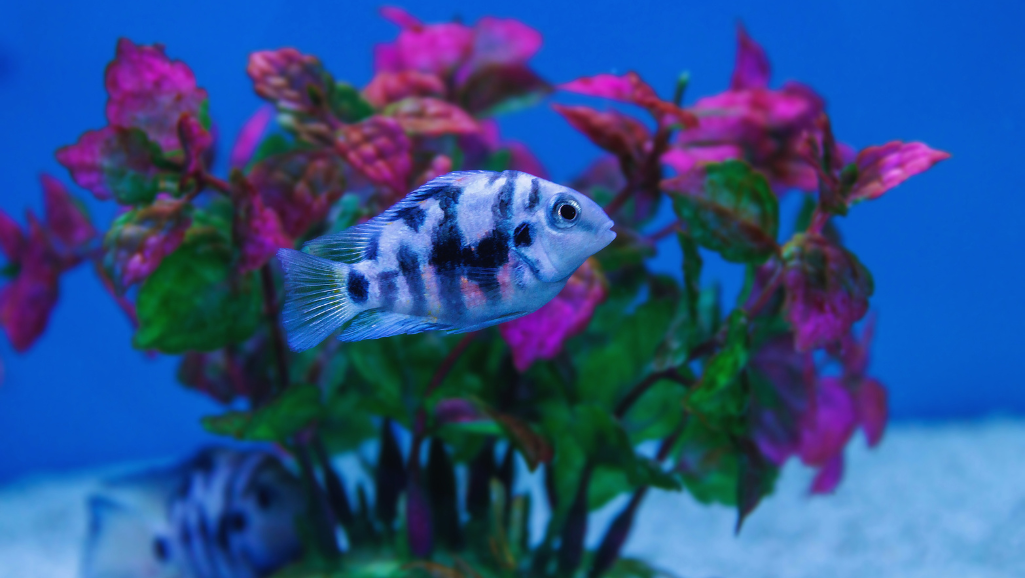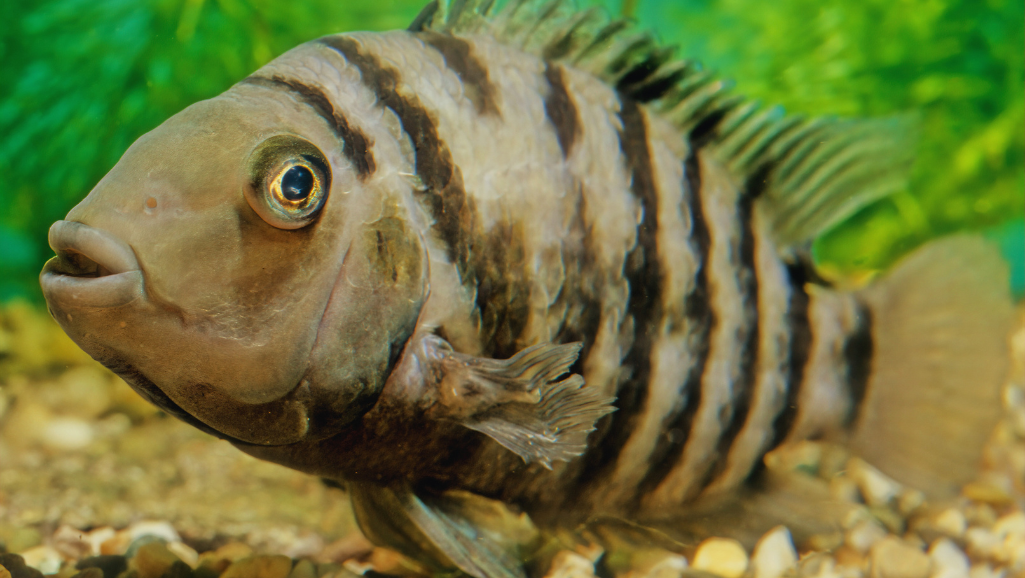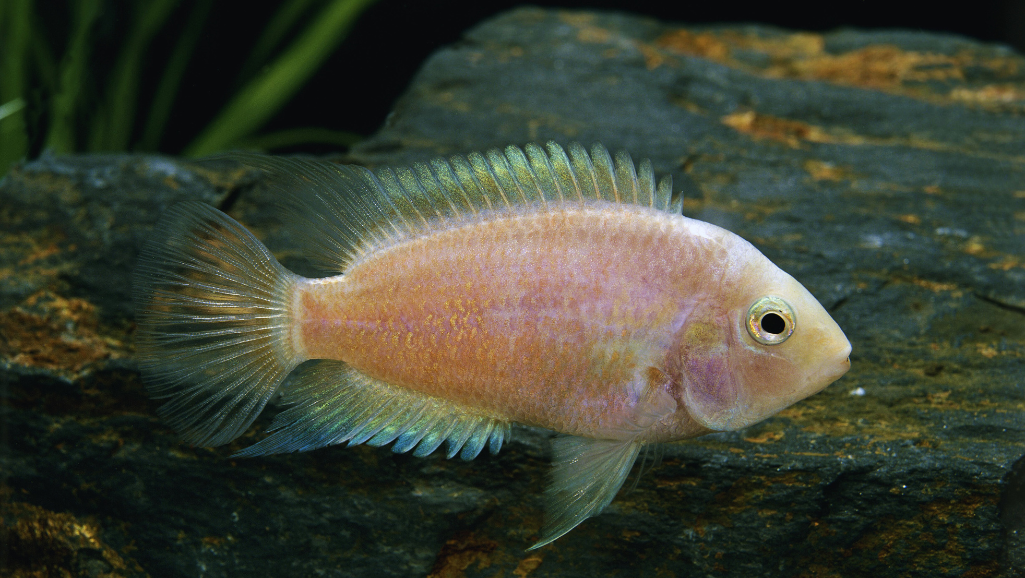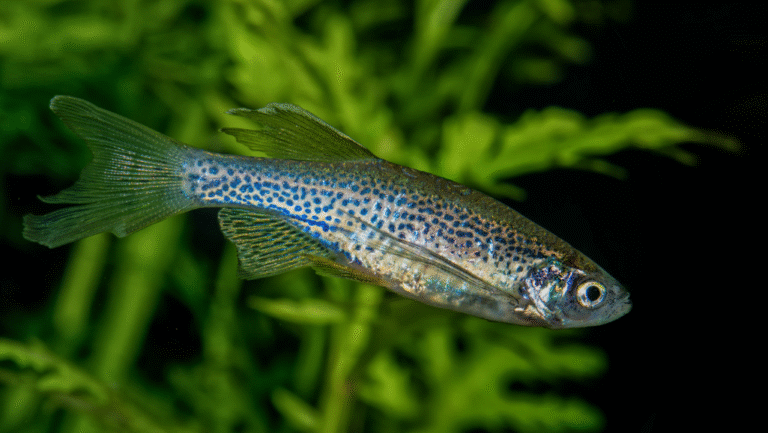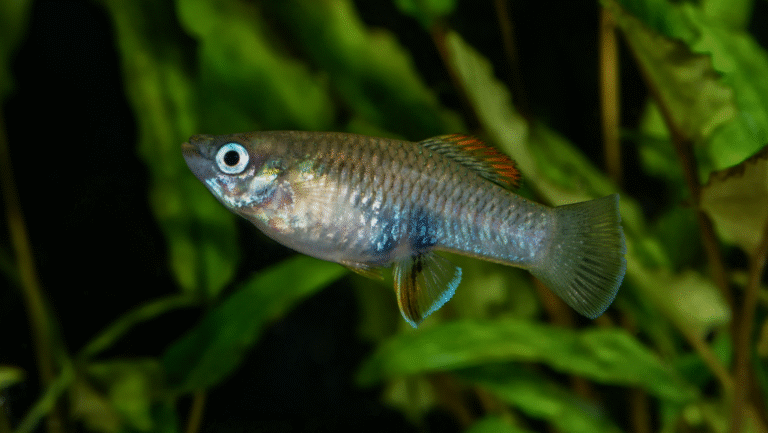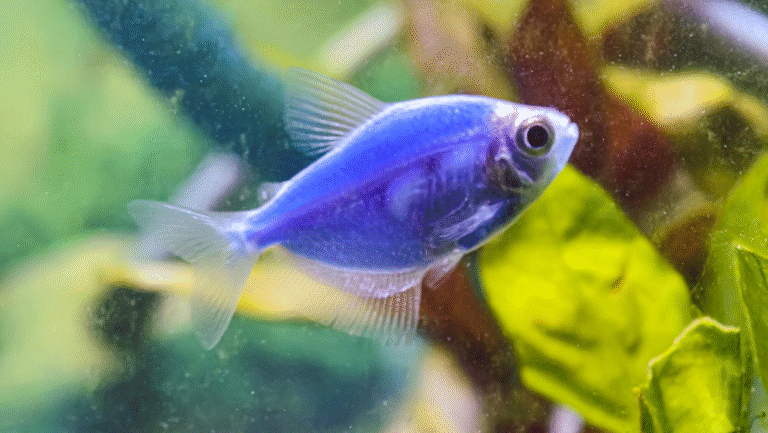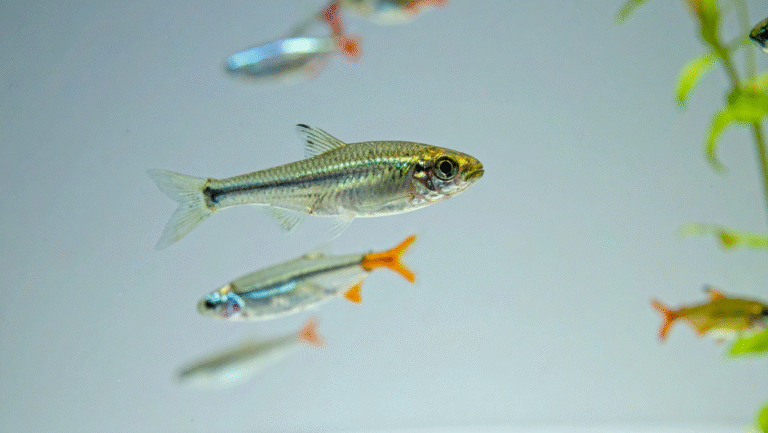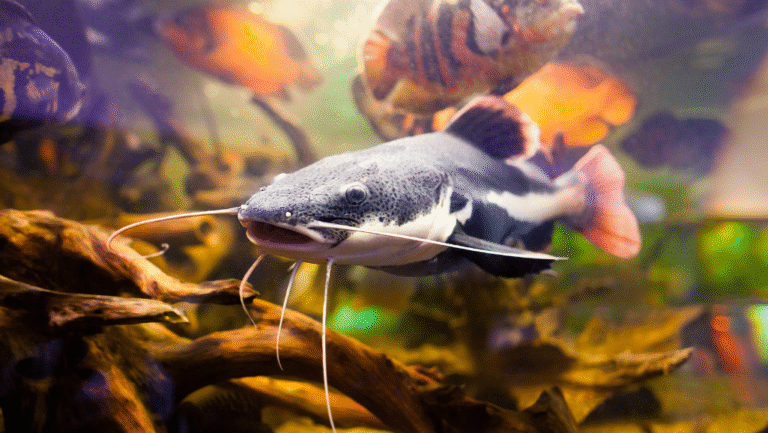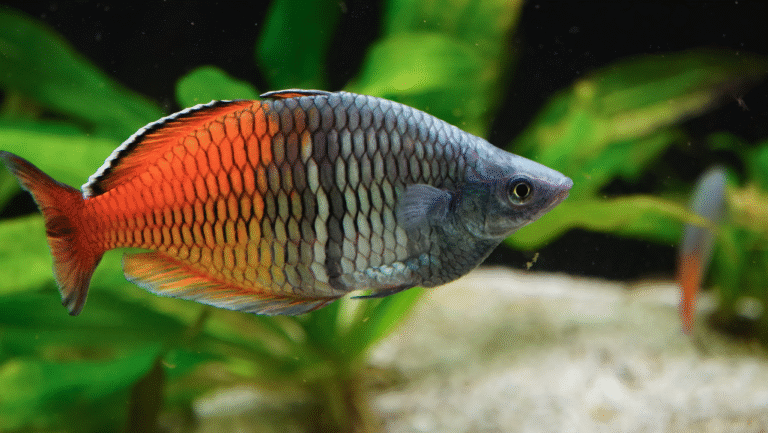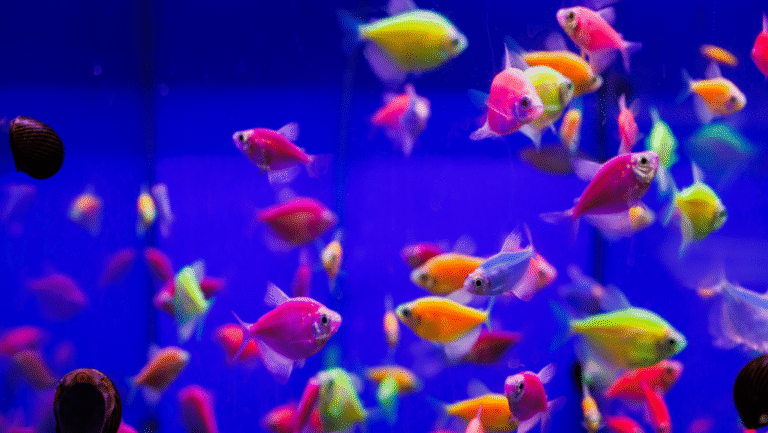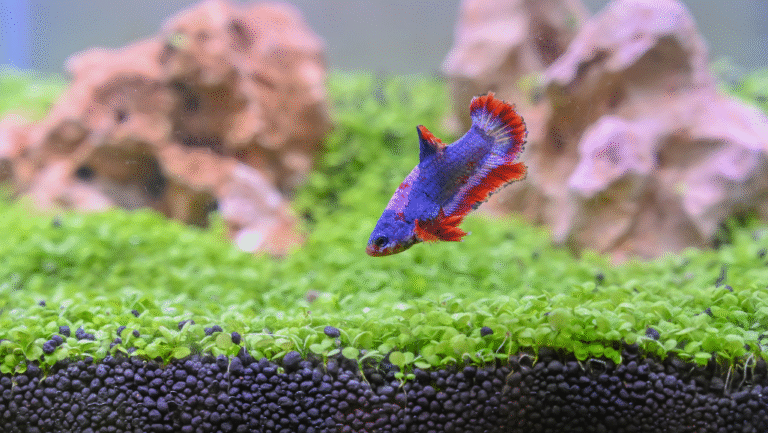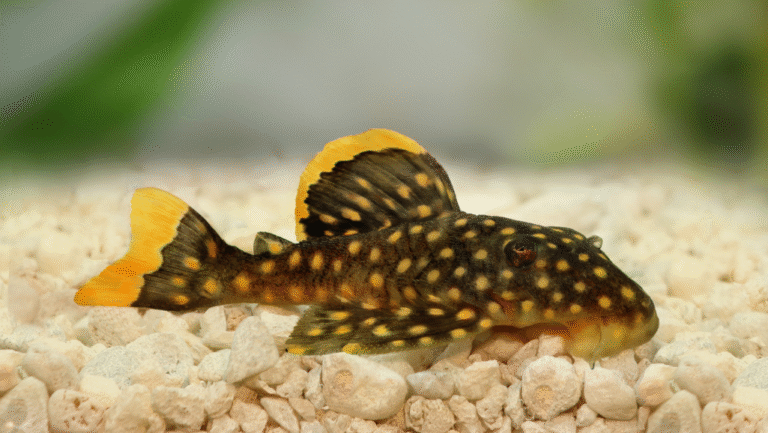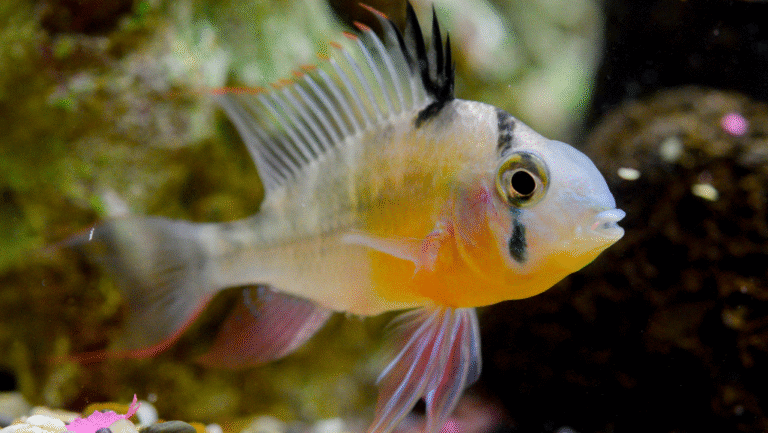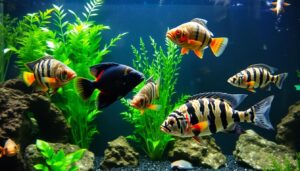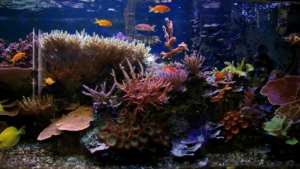The Convict Cichlid is a standout freshwater aquarium fish with bold black and white stripes. They come from Central America and are loved for their unique look and behavior. These fish can live for 8 to 10 years and grow up to 6 inches, making them a big commitment for aquarium owners.
Convict Cichlids are semi-aggressive and not the best for community tanks. They need a tank that’s at least 30 gallons to thrive. They like water between 79-84°F (26-29°C) and a pH of 6.5 to 8.0. Their adaptability and striking look make them a favorite among freshwater aquarium enthusiasts who want to spice up their tank.
These fish eat a variety of foods, including flakes, pellets, and live or frozen options. Their breeding habits are fascinating, with pairs forming strong bonds and fiercely protecting their young. However, this can make them more aggressive towards other fish during breeding.
Key Takeaways
- Convict Cichlids are known for their distinctive black and white striped pattern
- They require a minimum tank size of 30 gallons
- These cichlids have a lifespan of 8-10 years
- They exhibit semi-aggressive behavior, especially during breeding
- Convict Cichlids are adaptable and hardy, suitable for intermediate aquarists
Introduction to the Convict Cichlid
The Convict Cichlid is a vibrant member of the Central American Cichlids family. It’s a favorite among tropical fish enthusiasts. Known for its striking appearance and lively behavior, it’s a staple in many home aquariums.
Scientific Classification and Common Names
Scientifically named Archocentrus nigrofasciatus, this fish is known by several names. People often call it the Convict Cichlid, Black Convict Cichlid, or Zebra Cichlid. These names reflect its distinctive black and white striped pattern.
Origin and Natural Habitat
Convict Cichlids are native to Central America. They thrive in various freshwater environments. They live from Guatemala to Costa Rica, in both Pacific and Atlantic slope drainages. In the wild, they prefer rocky areas with lots of hiding spots.
Physical Characteristics and Appearance
Convict Cichlids have a unique look. Their bodies are usually grey or silver, with bold black vertical bars. During breeding, females show vibrant orange or red bellies, adding color to their appearance.
- Male Size: Up to 6 inches (15.2 cm)
- Female Size: Up to 4.5 inches (11.4 cm)
- Lifespan: Over 8 years
While their standard color is striking, there are albino and dark color varieties. These variations make Archocentrus nigrofasciatus a standout choice for those seeking unique and eye-catching fish.
Convict Cichlid Behavior and Temperament
Convict cichlids are known for their spirited nature among freshwater aquarium fish. These cichlid fish display a range of behaviors that make them fascinating to observe. Their aggressive behavior is particularly notable, especially during breeding seasons.
In captivity, convict cichlids often exhibit territorial tendencies. They claim specific areas of the tank as their own, fiercely defending these spaces from other fish. This behavior is more pronounced in pairs or groups, where dynamic interactions unfold.
A striking example of their temperament was observed on April 4, 2015. A female convict displayed heightened aggression, possibly feeling confined as her fry grew larger. The tank housed an estimated 20-30 young fish, showcasing the protective nature of these cichlids.
“Convict cichlids are the perfect example of how small fish can have big personalities in a freshwater aquarium.”
Their behavior can change based on their environment. On July 21, 2012, a black convict cichlid showed reclusive behavior after being moved to a new tank. It often hid in small spaces, rarely venturing out. This highlights the importance of a stable environment for these fish.
To manage their aggressive tendencies, it’s crucial to provide ample space and hiding spots. A minimum 30-gallon tank is recommended, though larger setups are ideal. Rocks, plants, and caves help create a suitable habitat for these lively freshwater, allowing them to express natural behaviors while minimizing conflicts.
Ideal Tank Setup for Convict Cichlids
Setting up the perfect aquarium for convict cichlids is vital for their health. These vibrant fish need a space that feels like home. It should match their natural environment closely.
Tank Size and Water Parameters
A 30-gallon tank is perfect for a pair of convict cichlids. Males can grow up to six inches, while females reach about four inches. Keep the pH between 6.5-7.0 and ensure ammonia levels are low. Use a Tetra EasyStrips 6-in-1 testing kit to check water quality often.
Substrate and Decoration
Sand is a great choice for the substrate, as they love digging in it. Add rocky caves, cichlid stones, and ceramic hideouts for their safety. Driftwood and root structures can make the tank feel more natural. Live plants like Java Fern and Amazon Swords not only look good but also help reduce aggression.
Filtration and Lighting Requirements
Convict cichlid tanks need strong filtration. Their messiness requires a powerful filter to keep the water clean. While they don’t need specific lighting, a balanced light cycle is good for plants and fish health.
| Tank Feature | Recommendation |
|---|---|
| Tank Size | 30 gallons for a pair |
| pH Level | 6.5-7.0 |
| Substrate | Fine sand |
| Decor | Caves, driftwood, live plants |
| Filtration | Strong, efficient system |
Regular care and watching your fish are crucial for a healthy convict cichlid tank. With the right attention, these freshwater aquarium fish will thrive in their new home.
Convict Cichlid Diet and Nutrition
Convict Cichlids are popular in freshwater aquariums. They are omnivores, which means they eat a variety of foods. In the wild, they eat plants, small animals, and other organic stuff.
To keep them healthy, feed them a mix of good commercial foods and fresh foods. Cichlid pellets are a main part of their diet. Add frozen treats like bloodworms for extra nutrition. Also, give them veggies like blanched spinach or zucchini for important nutrients.
It’s important to follow a feeding schedule for these fish. Give them small amounts 2-3 times a day. Make sure they can eat it all in a few minutes. This helps keep the water clean and prevents overfeeding.
| Food Type | Frequency | Benefits |
|---|---|---|
| Cichlid Pellets | Daily | Balanced nutrition |
| Frozen Bloodworms | 2-3 times weekly | Protein boost |
| Blanched Vegetables | 1-2 times weekly | Fiber and vitamins |
Feeding your Convict Cichlid well makes them look vibrant and act lively. A good diet keeps them healthy and happy in your aquarium.
Breeding Convict Cichlids
Convict cichlids are known for their active breeding. They show strong pair bonding and care for their young. This makes them interesting for those who love aquariums.
Pair Bonding and Courtship
To start breeding, put 6 convict cichlids in a 20-30 gallon tank. This helps them pair naturally. Keep the water at 75-79°F and pH 6.5-8.0 to encourage breeding.
Egg Laying and Parental Care
Once paired, they lay 100-200 sticky eggs on cave walls. Both parents protect and fan the eggs. The eggs hatch in about 3 days.
The fry stay near the cave but go out at night to eat. Parents even carry fry in their mouths to keep them safe. This shows their dedicated care.
Fry Development and Care
Fry live off their yolk sacs for 5-7 days after hatching. Then, feed them brine shrimp nauplii and later crushed flake food. Move the fry to a separate tank after 10-14 days to keep them safe from their parents.
| Breeding Aspect | Recommendation |
|---|---|
| Tank Size | 20-30 gallons per pair |
| Water Temperature | 75-79°F |
| pH Level | 6.5-8.0 |
| Eggs Per Brood | 100-200 |
| Hatching Time | 3 days |
Successful breeding of convict cichlids needs patience and good aquarium care. With the right setup, you’ll see the eggs turn into free-swimming fry. It’s a rewarding experience in fish breeding.
Compatible Tank Mates for Convict Cichlids
Choosing tank mates for Convict Cichlids can be tricky. These Cichlid Fish are aggressive and need strong companions. Let’s look at some good options for your Freshwater Aquarium Fish setup.
When picking tank mates, look for fish with similar temperaments and size. Oscar fish are great companions for Convict Cichlids. They have semi-aggressive behavior, making a good match.
Other good Tropical Fish include:
- Green Terror Cichlids
- Firemouth Cichlids
- Electric Blue Acara
- Jack Dempsey Cichlids
These fish need similar water and can live with Convict Cichlids. Make sure to give them enough space and hiding spots to lower aggression.
| Fish Species | Adult Size | Minimum Tank Size | Temperature Range |
|---|---|---|---|
| Convict Cichlid | 4-5 inches | 30 gallons | 79°F – 84°F |
| Oscar Fish | 10-12 inches | 55 gallons | 74°F – 81°F |
| Green Terror | 12 inches | 35 gallons | 68°F – 77°F |
| Firemouth Cichlid | 7 inches | 30 gallons | 75°F – 86°F |
Remember, a good tank setup is essential. Use driftwood, rocks, and plants to make territories. This helps reduce aggression in your fish community.
Health and Common Diseases of Convict Cichlids
Convict cichlids are tough fish for freshwater tanks. But, they can still get sick. To keep them healthy, focus on their tank and food. Let’s look at how to spot sickness and keep them well.
Recognizing Signs of Illness
When convict cichlids get sick, they show different signs. Watch for these:
- Pale color or loss of stripes
- Lethargy or unusual swimming patterns
- Bloating or swelling
- Loss of appetite
- Raised scales
- Growths on fins or gills
Preventive Care and Treatment
Keeping the tank clean is vital to stop diseases. Use the right tools for cleaning and test the water often. Here are some tips:
- Monitor water quality regularly
- Perform routine water changes
- Provide a balanced diet
- Maintain proper tank temperature
- Ensure adequate filtration
If your cichlid looks sick, act fast. Move the sick fish to a separate tank. Check the water and consider treatments. For serious cases, see a fish vet. A clean tank is your best defense against fish diseases.
Convict Cichlid Varieties and Color Morphs
Convict Cichlids are popular in Freshwater Aquariums. They come in many eye-catching colors. These colors and patterns make them a hit among tropical fish fans.
The most common type has a grey to silver body with black vertical bars. This look is why they’re called “convicts.” The aquarium trade also offers special color variations for those looking for something different.
The Albino variety, known as Pink, White, or Gold, lacks the black bars. It has a pale body and reddish eyes. The Black Convict Cichlid has a darker color overall.
Breeding these Tropical Fish can create interesting color combinations. Proper tank conditions are key for successful breeding and vibrant colors. Here’s a look at some breeding results:
| Parent Combination | Offspring Colors | Ratio |
|---|---|---|
| Marble-gene Black x Marble | Black and Marble | 65.91% Black, 34.09% Marble |
| Marble Male x Pink Female | Marble and Pink | 62.5% Marble, 37.5% Pink |
| Black x Black (with marble gene) | Black and Marble | 3:1 (Black:Marble) |
These color variations bring diversity to aquariums. They offer exciting chances for fish keepers to breed. Remember, all Convict Cichlids need similar care and tank setups to do well.
Conclusion
Convict Cichlids are fascinating freshwater fish known for their striking looks and interesting behavior. They have black and white stripes, making them a favorite among aquarium fans. Breeding Convict Cichlids is a rewarding hobby, as they show remarkable care for their young and complex social behaviors.
These fish come from Central America but can be found in places like Australia, Japan, and the USA. They can live in various water conditions, making them adaptable to different aquariums. Despite their small size, they have a big personality and are very territorial.
Research shows that Convict Cichlids form long-term pair bonds and have complex breeding behaviors. Studies by Itzkowitz, Snekser, and others emphasize the role of parental care and mate fidelity. While they can be tough to keep with other fish, they are a captivating choice for those who love cichlids and want to see complex behaviors in their aquarium.
